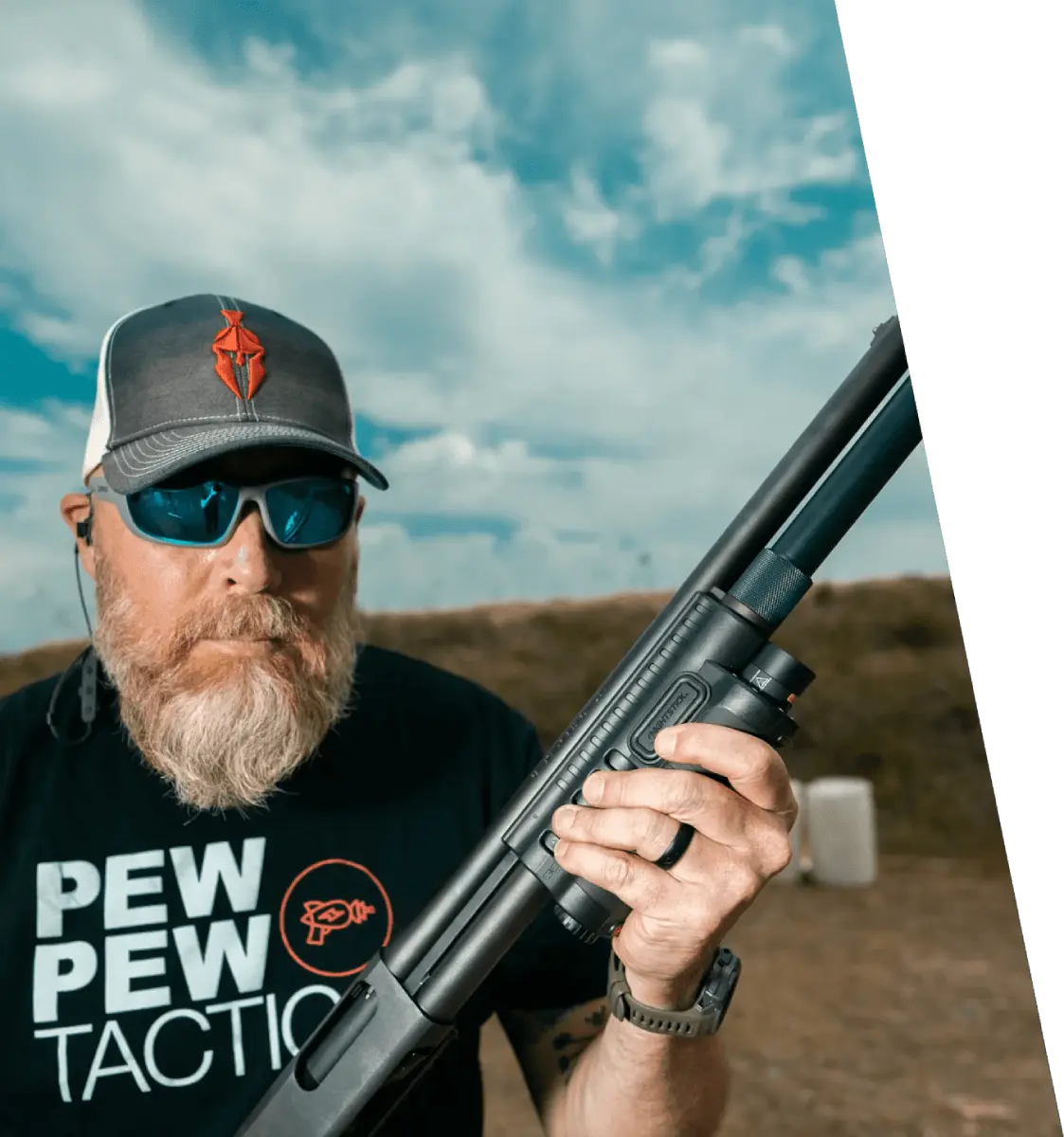Last Updated: July 17, 2025
Disclaimer: While the information provided here is legal in nature, it is not to be construed as legal advice and is for educational and entertainment purposes only.
Introduction
Alaska, officially known as America’s “Last Frontier,” ranks as one of the most gun-friendly states in the union, presenting few hurdles or headaches for law-abiding residents wanting to exercise their Second Amendment rights.

Buying, owning, and using a gun in Alaska is easier than almost anywhere in the country, which is bad news for massive grizzlies looking to mess up your day.
Of course, no state is perfect, so we’ll go over all you need to know about buying and using firearms in Alaska.
Table of Contents
Loading...
Snapshot Summary
- Permit to Own/Purchase a Firearm: No
- Permit to Own/Purchase Ammunition: No
- Firearm Registration Requirements: No
- Firearm Restrictions/Bans: No
- Magazine Restrictions/Bans: No
- Other Restrictions/Bans: No
- Safe Storage Laws: No
- Concealed Carry: Yes, Shall Issue/Constitutional Carry
- Open Carry: Yes
- Castle Doctrine: Yes
- Stand Your Ground Laws: Yes
- Duty to Retreat: No
Before We Get Started
Contrary to many states, Alaska prohibits local governments from creating stricter gun restrictions and penalties than those already established in state law. Ordinances created to protect people, animals, and property from damage cannot infringe on your right to keep and bear arms. This setup makes it easier to stay on top of gun laws in the state.
Gun Ownership Laws
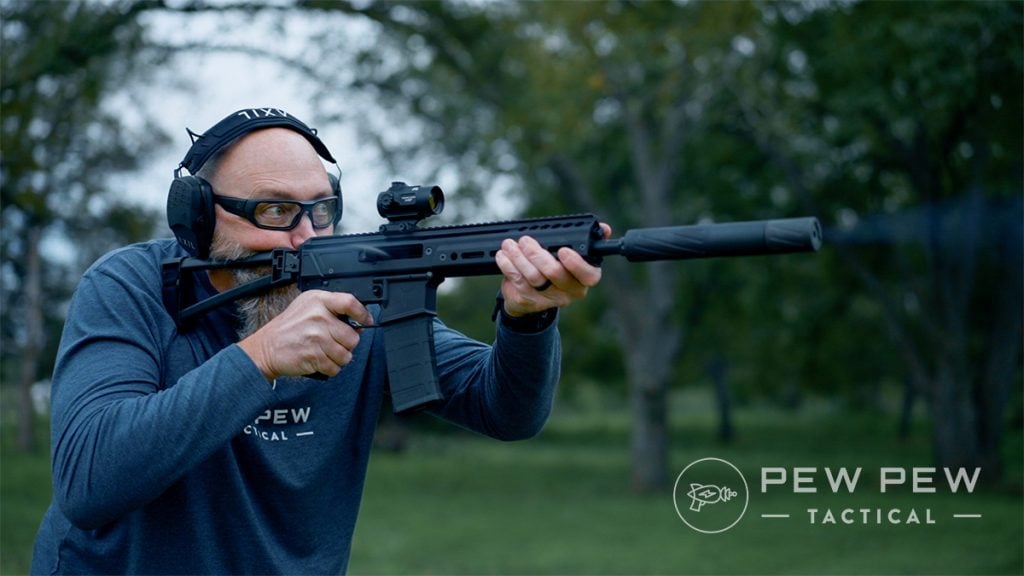
In Alaska, you may not purchase, own, or possess a gun if you:
- Are a fugitive from justice
- Are illegally or unlawfully in the United States
- Are in the United States on a non-immigrant visa
- Were dishonorably discharged from the U.S. military
- Have renounced your U.S. citizenship
- Unlawfully use or are addicted to any controlled substance
- Have been adjudicated as a “mental defective” or have been committed to any mental institution
- Have been convicted of or are under indictment for any crime punishable by imprisonment for a term exceeding one year
- Have been convicted of a:
- Felony against a person
- Felony not against a person and less than 10 years have passed since you were unconditionally discharged or since the date of your violation
- Domestic violence misdemeanor
- Have been adjudicated as a juvenile delinquent for a crime that, if committed by an adult, would be a felony
- Are subject to any protective order that prohibits gun possession
- Are subject to a valid domestic abuse restraining order
You also may not possess a firearm anytime you are intoxicated or under the influence of drugs or alcohol.
According to Alaska law, a felony (which will disqualify you from possessing a firearm) is any crime that carries a possible jail sentence of one year or more. Examples include:
- Murder
- Manslaughter
- Assault
- Rape
- Sexual assault
- Human trafficking
- Kidnapping
- Crimes against children and minors
- Burglary
- Armed robbery
- First-degree stalking
- Arson
Underage Gun Ownership
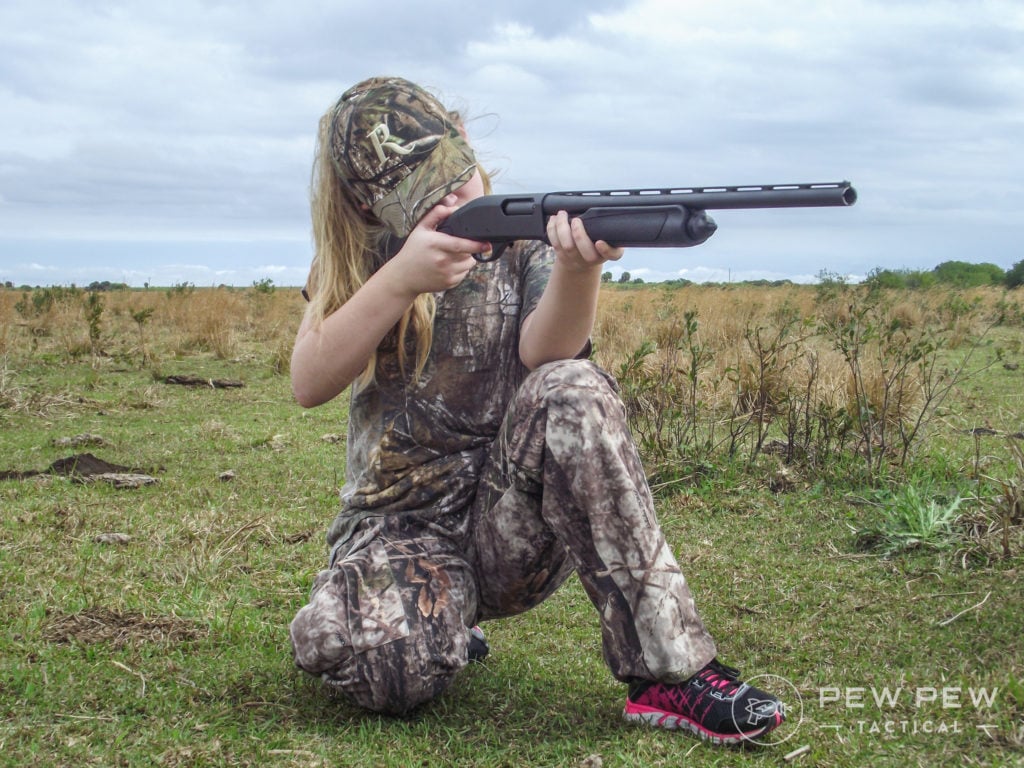
State law prohibits anyone from selling any firearm to a minor but allows anyone 16 or older to possess a firearm. It is also illegal for an unemancipated minor under 16 to possess a gun without their parent or guardian’s permission.
Safe Storage & Child Access Prevention Laws
Alaska law does not require firearms to be stored in any particular manner. That said, please use common sense and keep your guns inaccessible to untrained children and irresponsible adults.
Firearm Registration Requirements
Alaska does not require gun owners to register their firearms.
Restrictions and Bans
Alaska does not restrict or ban ownership of any firearms/firearm types, magazines, or accessories except those already banned or restricted by federal law. If you want an AR-15 with a 50-round drum magazine, a bump stock, AND a forced reset trigger, the only laws holding you back are the laws of physics.
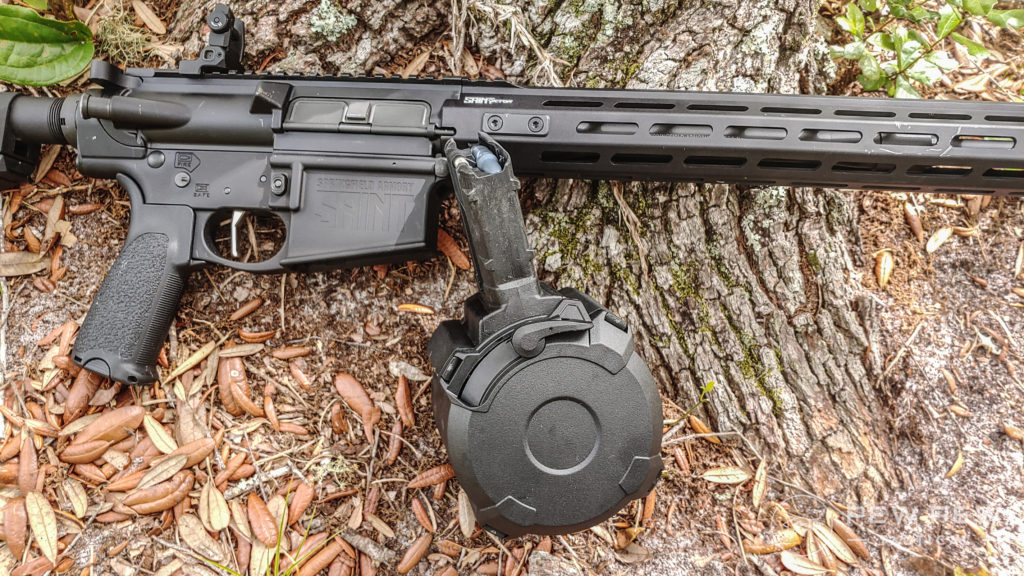
Purchasing a Gun
Dealer Purchasing
Once you meet all legal requirements for gun ownership, buying a firearm from your local Alaska gun store is as easy as it gets anywhere in the country.
Buying a Handgun
To buy a handgun in Alaska, you must
- Be 21 or older (federal law)
- Meet all legal requirements for handgun possession
- Have a valid Alaska photo ID
- Submit to an instant background check
That said, you can avoid having to go through the background check each time you buy a gun if you present a valid ACHP that is “NICS Exempt.”
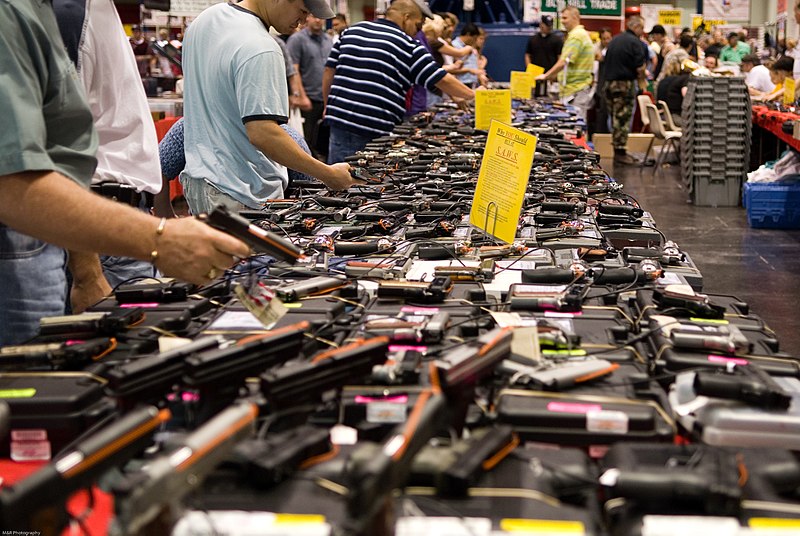
Buying a Long Gun
To buy a long gun, you must:
- Be 18 or older
- Meet all legal requirements for handgun possession
- Have a valid Alaska photo ID
- Submit to an instant background check
Private Sales
Private gun sales and transfers are almost completely unrestricted in Alaska. No background checks are necessary; however, it is illegal to knowingly transfer ownership of a handgun to someone who isn’t legally eligible to possess a firearm.
The biggest advantage to private gun purchases belongs to individuals aged 18 to 20. Under Alaska law, you must be at least 18 to purchase any firearm, including a handgun. While you may not be eligible for concealed carry just yet, you could have up to three years of training and practice under your belt for when you finally start carrying or obtain your ACHP.
Military
Federal law requires licensed firearms dealers to accept PCS orders and a military ID as the equivalent of a state driver’s license or state ID in the state where you are stationed. Alaska does not have any perks or extra requirements for military members who wish to buy a gun.
Antiques and Heirlooms
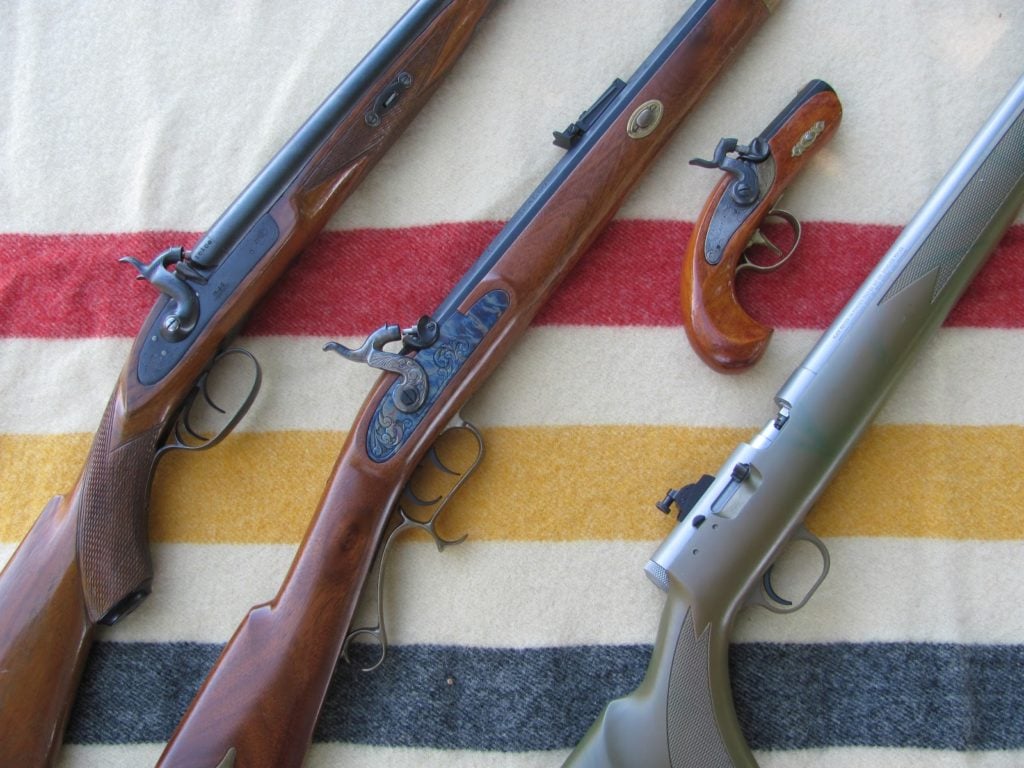
Alaska has no special laws or regulations for antique firearms. Federal law defines an antique firearm as any matchlock, flintlock, percussion cap, or similar firearm manufactured before 1899 or a replica of such firearm that:
- Is not designed or redesigned for using rimfire or conventional centerfire fixed ammunition
- Uses rimfire or conventional centerfire fixed ammunition that either is no longer manufactured in the US or is not readily available on the US market
Purchasing Ammo
Under federal law, you must be at least 21 to purchase handgun ammunition, but purchases for long gun ammo are legal for anyone 18 or older.
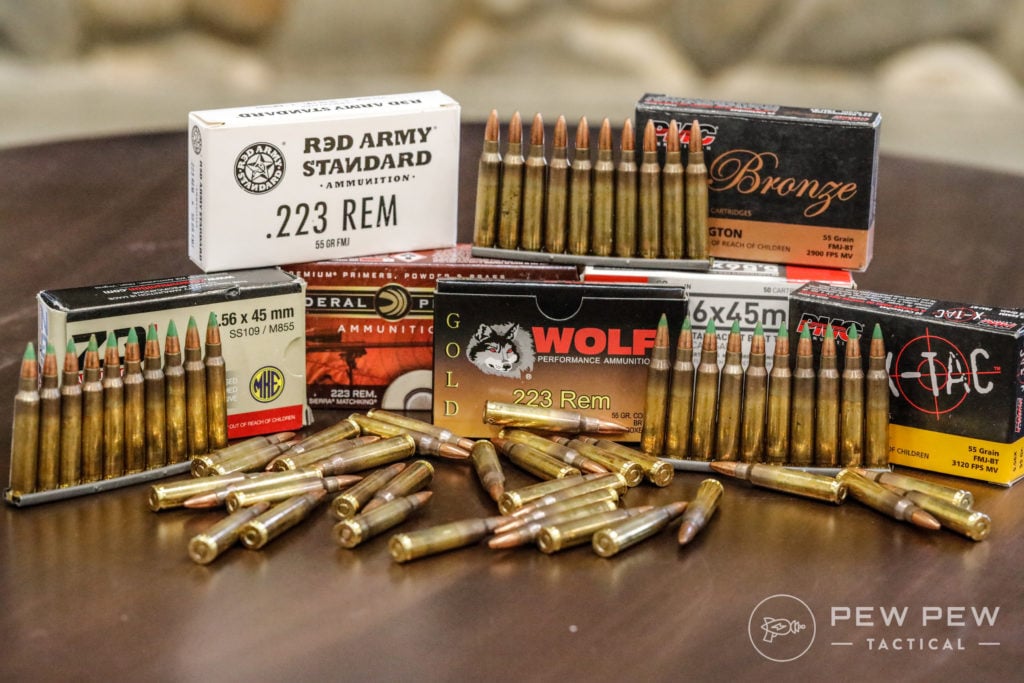
Alaska has one significant state restriction on who can purchase ammunition. The state’s parole board can prohibit an individual from possessing ammunition (or weapons) as a condition for parole.
Concealed Carry & Open Carry
Alaska is an incredibly gun-friendly state that embraces constitutional carry for anyone. This applies to both open and concealed carry and covers both residents and non-residents who abide by both state and federal gun laws.
One noteworthy carry law is Alaska’s ban on using or carrying a firearm while you are intoxicated.
Open Carry
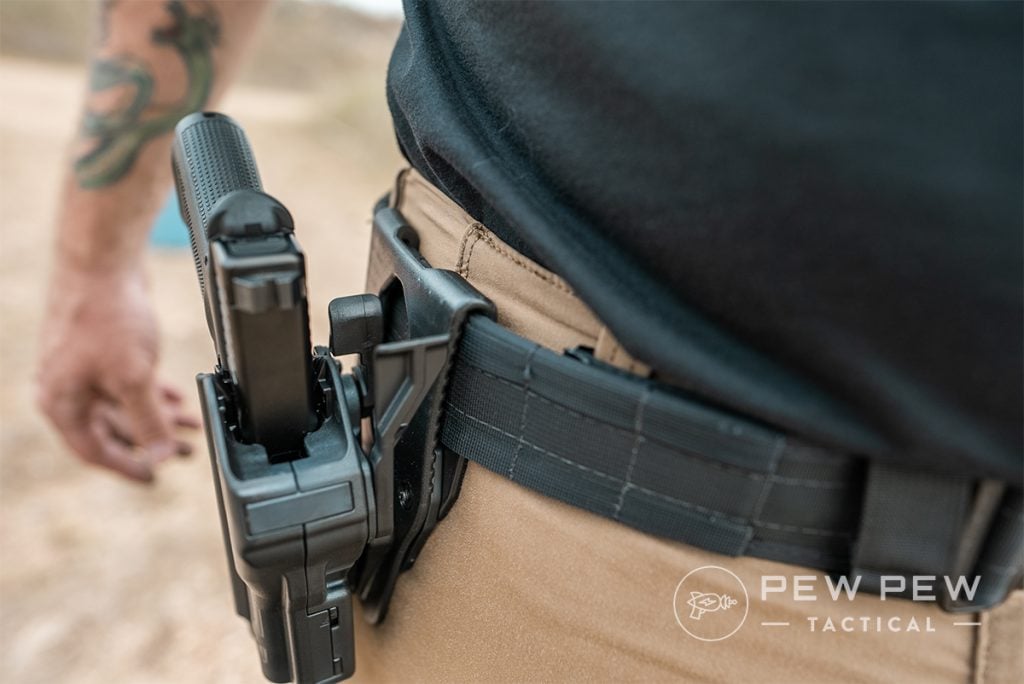
On the state level, Alaska permits open carry of a firearm, although you must be at least 18 and otherwise legally permitted to possess a firearm in order to carry.
Concealed Carry
In 2003, Alaska became the second state to institute constitutional carry. (The first was Vermont in 1793.) Alaska’s law applies to all residents and non-residents who are 21 or older and abide by state and federal law.
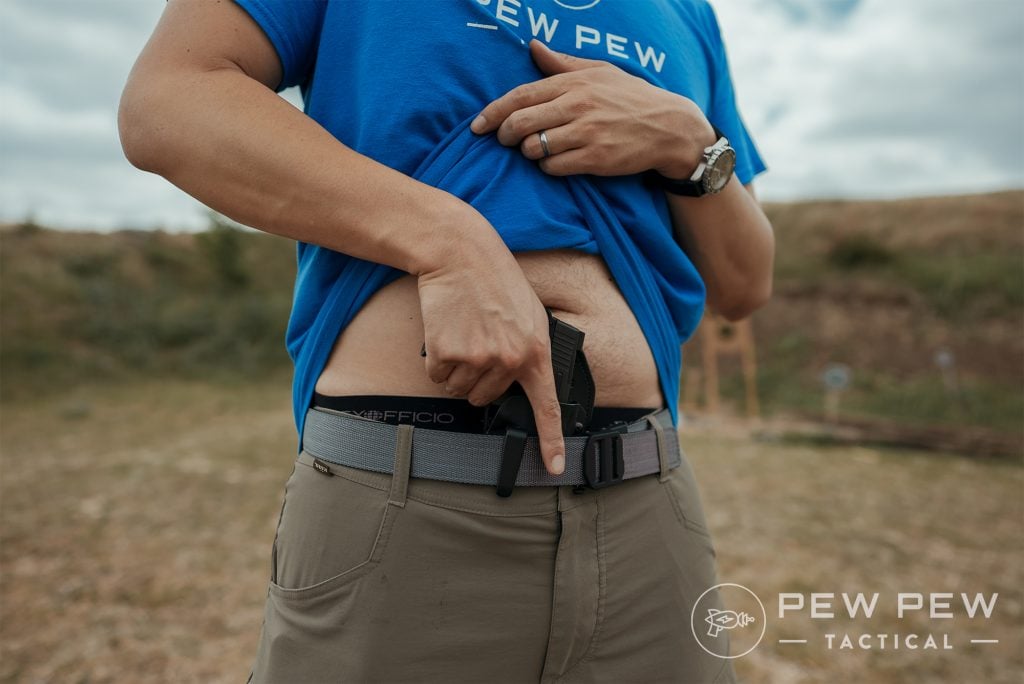
The state’s constitutional carry law negates the need for most state residents to obtain an Alaska Concealed Handgun Permit (ACHP). That said, an ACHP is worth it if you travel to other states that require a concealed carry permit and have reciprocity with Alaska.
Getting Your ACHP
To apply for an ACHP, you must:
- Be at least 21 years old
- Be a US citizen or legal US resident
- Be a legal resident of Alaska resident
- Have lived in Alaska for more than 90 days
- Have a valid Alaska photo ID
- Meet all legal requirements to possess a firearm
- Not be convicted of two or more Class A misdemeanors under Alaska or similar law within the last six years
- Not have been in a court-ordered alcohol or substance abuse treatment program within the last three years
- Complete a state-approved in-person firearms safety course within the last 12 months
- Submit a passport-style photograph taken within the last 30 days
- Submit two FBI-approved fingerprint cards with fingerprints taken by an approved fingerprinter
- Have $87 for the application fee (cash, check, or money order)
NICS Exempt Permits
It is worth noting that Alaska gives you the option to obtain a NICS exemption to go with your ACHP.
By completing additional paperwork with your permit application, you can qualify to skip the NICS background check process at your local gun store when presenting a valid permit. This makes buying guns an easier process.
If you want to add the exemption to a permit you already possess, use this form.
Training & Licensure Requirements
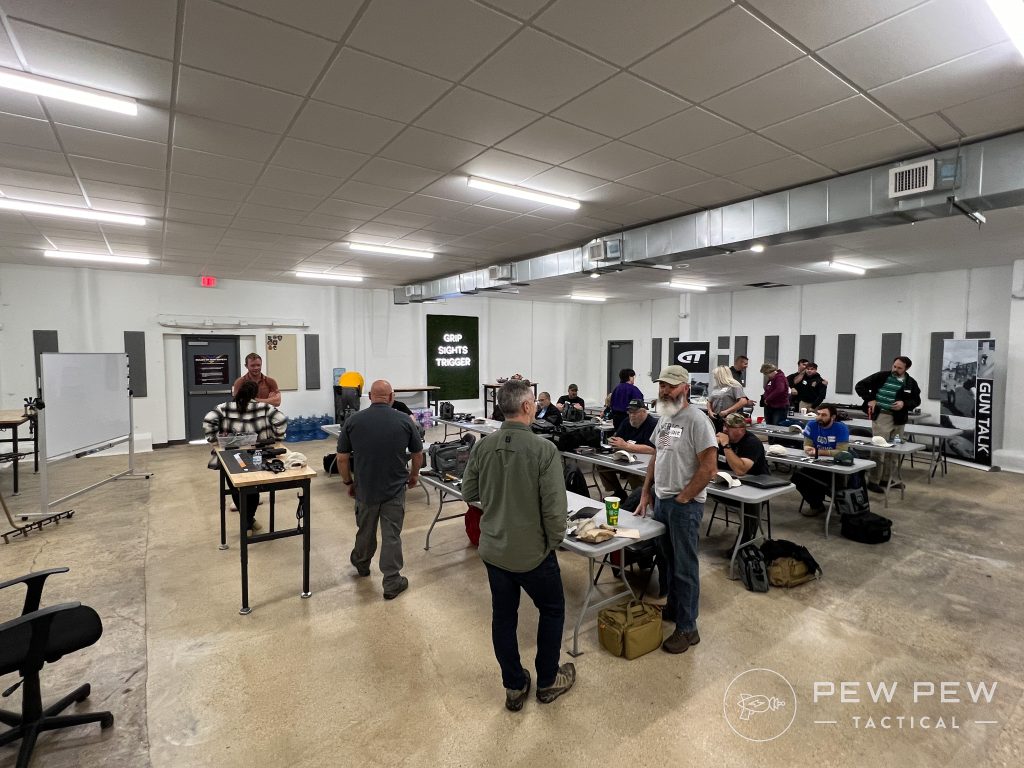
Alaska’s ACHP training requirements are relatively lax compared to most states, but there are still requirements. To qualify for a permit, you must complete a state-approved handgun course that includes the NRA’s Personal Protection Course. The course must also include a test of your:
- Knowledge of Alaska gun and use of deadly force law
- Familiarity with basic handgun safety concepts
- Knowledge of self-defense principles
- Physical handgun competence
For a list of approved courses, you must contact the Department of Public Safety (DPS) directly. We recommend calling the Permits and Licensing Unit directly at (907)269-0392.
The Waiting Game
Once you’ve got everything squared away, you will need to submit your application to DPS. You must submit your application in person at a State Trooper, Wildlife Trooper, or authorized municipal police department office.
You should hear within 30 days of submitting your application whether it was approved or denied. During that time, DPS will conduct a background check and determine if you are eligible for a permit.
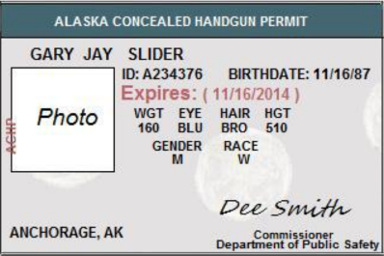
The department will issue a conditional permit if the fingerprint review is not completed before the 30-day deadline. This permit will be revoked if the late fingerprint review returns a negative report.
If you are denied, you will receive a written notification detailing DPS’s reasons. You may appeal the denial to the DPS Commissioner. If the commissioner denies your appeal, you can request a judicial review of his or her decision.
Along those lines, even if you have already been issued a permit, DPS can suspend or revoke your ACHP if the department determines you no longer meet all permit requirements.
Since Alaska is a shall-issue state, DPS must issue you an ACHP if you meet all the requirements. Your ACHP expires five years after your most recent birthday, meaning it will be valid for a maximum of five years.
Renewing Your ACHP
You can start the renewal process up to 90 days ahead of your permit’s expiration date. There is also a 60-day grace period after your permit expires. After that, you will have to apply for a brand-new permit, including the training course.
To renew your ACHP, you must submit a renewal application, a renewal fee, and a new passport-style photo. The fee will be $25 if your application is submitted before your permit expires, but during the grace period after it expires, the renewal fee jumps up to $50.
You can submit your completed application by mail, delivery service (UPS, FedEx, etc.), or in-person delivery to a State Trooper, Wildlife Trooper, or authorized municipal police department office.
Remember that if you want to renew (or add) the NICS exemption to your ACHP, you will need to complete the proper form (included with the application) and submit it with your application packet.
Any ACHP Exceptions or Loopholes?
Constitutional carry is the biggest exception to any concealed carry permitting requirement.
Since Alaska does not issue unique IDs to law enforcement, there is no way for retired Alaska law enforcement officers to carry concealed under the federal Law Enforcement Officers Safety Act of 2004 (LEOSA) in other states. Instead, you will need to apply for an ACHP like everyone else.
Prohibited Places
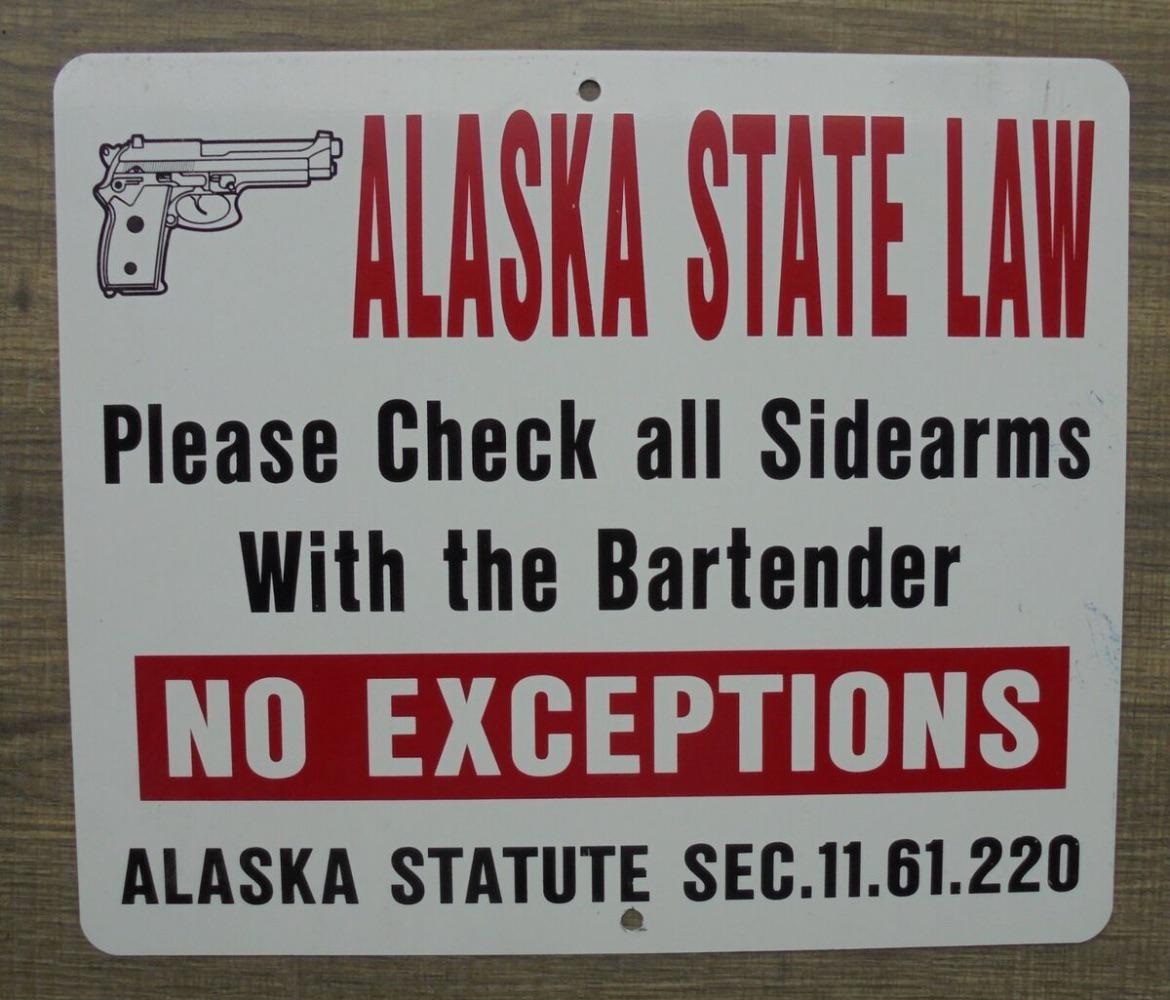
Even though open carry and concealed carry (with or without an ACHP) are widely allowed, there are still places where you cannot carry a firearm. Specifically, Alaska prohibits handguns on or in:
- In someone else’s home without his or her permission
- Public or private K-12 schools, school property, and school buses without the school administrator’s knowledge and consent
- Licensed childcare facilities or the grounds or parking lot(s) immediately adjacent to the facility unless the facility is in a private residence
- Courtrooms or court system offices
- Courthouses solely occupied by the court system or other justice-related agencies
- Federal buildings, including post offices and National Park visitor centers and ranger stations
- Correctional facilities
- State-funded domestic violence or sexual assault shelters
- Secure areas in airports
- Federal property (except for outdoor spaces in national parks, national forests, etc.)
- Any other location prohibited by federal law
It is also illegal to carry a loaded firearm into any bar (or other establishment that sells alcohol for consumption on the premises):
- Unless the gun is concealed so well that it will not print
- Except at restaurants if you do not consume any alcohol
Other places also regularly ban firearms. These are determined on a case-by-case basis and don’t fall under state law. These places include:
- Native American reservations (under tribal law)
- Colleges and universities
- Hospitals
- Gymnasiums
- Places of worship
- Stadiums, arenas, and other sports facilities
- Gambling facilities
- Polling places
It is perfectly legal to carry guns openly or concealed in national parks or national forests if you abide by state law. That said, you cannot carry in visitor centers, ranger stations, offices, or maintenance buildings, since these are all technically federal buildings.
If you do happen to visit a prohibited place, just leave your handgun in the car in accordance with state transportation storage laws.
Concealed Carry Reciprocity
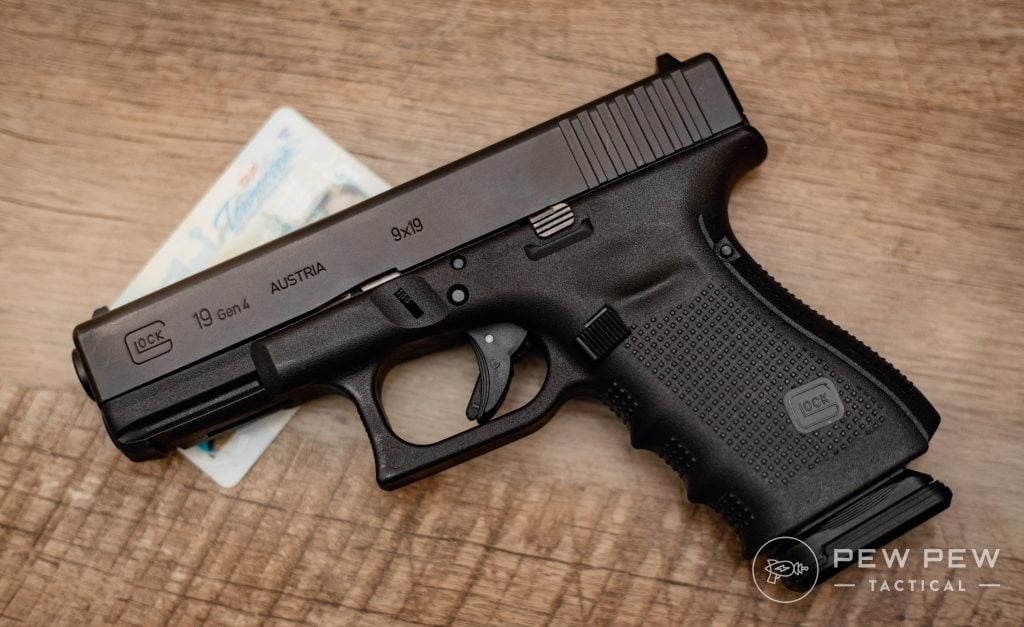
Most states allow ACHP holders to carry concealed, although this is more due to constitutional (permitless) carry laws on the books rather than official reciprocity. The age of eligibility varies by state, and the laws for permitless carry may differ from regular concealed carry laws, even within the same state.
Michigan also recognizes Alaskan ACHPs; however, the Great Lakes State has additional restrictions that you will need to know before carrying.
While most states recognize ACHPs (or don’t care about permits at all), there are still some that do not. An ACHP is not recognized in:
- California
- Connecticut
- Hawaii
- Illinois
- Maryland
- Massachusetts
- New Jersey
- New Mexico
- New York
- Oregon
- Rhode Island
- Washington
- Washington D.C.
Note: You’ll want to take a look at our state gun law guides for whichever state you’re planning on visiting, just to familiarize yourself with the gun laws on carrying while out there and be aware of the differences you might need to be careful of.
Always check the law in the state you’re traveling to before you carry there.
Carry Laws for Out-of-State Visitors
For those of you who already have CCW permits from other states, Alaska has you covered. The state recognizes every valid out-of-state permit.
The only other requirements for out-of-state CCW permit holders are that you abide by Alaska’s gun and concealed carry qualification laws and that you are in the state legally.
Alaska’s constitutional carry law requires you to be 21 or older to carry without a permit and does not require you to be an Alaska resident. The only other requirements are that you abide by the state and federal gun laws and that you are in the state legally.
Transporting Your Guns
Alaska’s firearm transportation laws are very limited. If you can legally possess a firearm, you can store or transport your gun anywhere inside your vehicle as long as it is in a locked container. The only exception is when you park your car illegally.
If you leave your firearm inside your vehicle for any reason, you must store your gun locked inside the vehicle. (We recommend also storing your gun out of sight and, depending on where you parked, inside a locked container.)
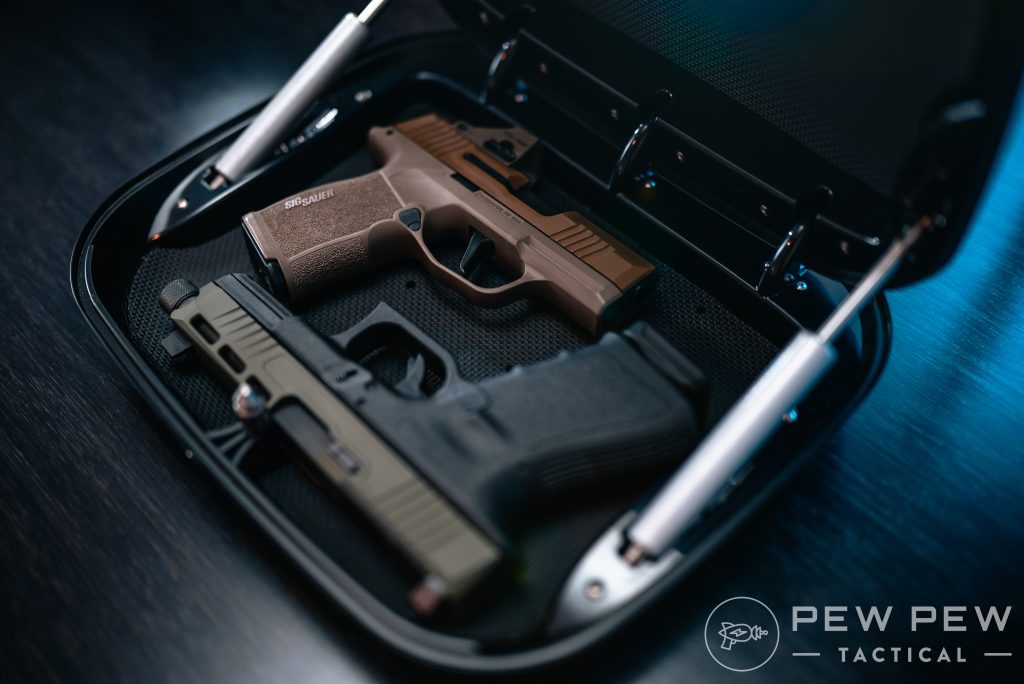
If you are 21 or older, you can do the same thing on school property (such as a school parking lot), but your gun must also be unloaded.
Alaska law specifically protects your right to store your firearm inside your vehicle without anyone telling you otherwise. The one exception is if you are driving a vehicle owned, leased, or rented by your employer (or their agent), in which case, they can post signs prohibiting firearms within 100 yards of a secured, restricted area that
- Has signs conspicuously posted
- Does not include entrances and exits open to the general public
During a traffic stop, you must inform the officer if you are carrying a concealed weapon even if you have a valid ACHP.
Just Passin’ Through: Alaska Native Lands
Due to the historical treaties between the US government and the Alaska Native tribes, each tribe has its own unique laws. As such, Alaska law does not override tribal law, and many tribes do not recognize Alaska’s constitutional carry law or ACHPs.
The federal Firearms Owners Protection Act (FOPA) makes it legal for you to transport any firearm across tribal lands as long as the gun is legal for you to own or possess both in your original location and your final destination. The key requirements are that you also abide by tribal firearm transportation laws and that you are actively “traveling” across tribal land.
The legal definition of “traveling” is a little hazy, and one law enforcement officer may not interpret the term the same as another. Some travelers in other states report that simply leaving your firearm locked inside your vehicle is good enough on some tribal lands, but other tribes might interpret FOPA differently.
Stopping for gas or a restroom break shouldn’t be an issue if your gun is unloaded and locked in the trunk or back seat, but we recommend checking tribal law before scheduling an extended meal with friends on tribal land.
Self-Defense/Use of Force
When Is Lethal Force Allowed?
Aside from practicing at the shooting range, you hopefully will never need to fire your guns. If you are ever faced with a deadly threat to yourself or others, however, Alaska does allow for the use of deadly force in certain circumstances. That said, your use of force must always be proportional to the threat.
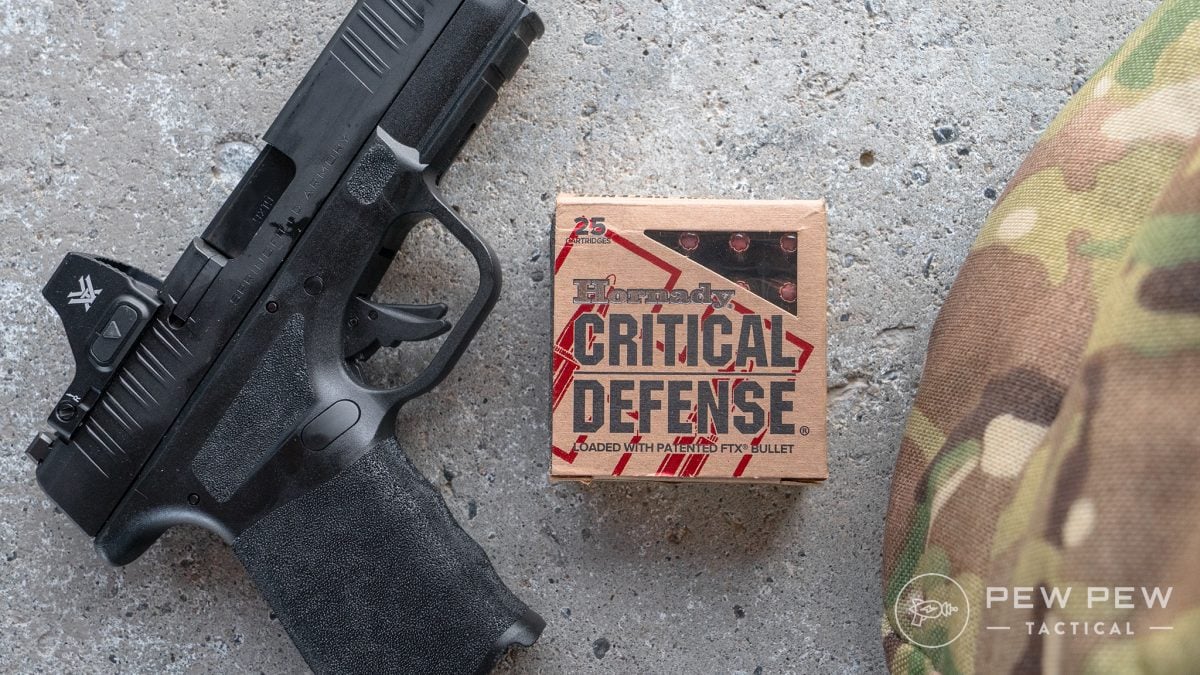
State law specifically protects your right to use deadly force if you reasonably believe deadly force is necessary for self-defense against:
- Death
- Serious physical injury
- Kidnapping (except for custodial interference situations)
- First- or second-degree sexual assault
- First-degree sexual abuse of a minor
- Robbery
All that said, there are limits. You cannot claim self-defense in Alaska if you know that you used deadly force but could have left the situation without any harm to yourself or others without the use of deadly force.
Castle Doctrine
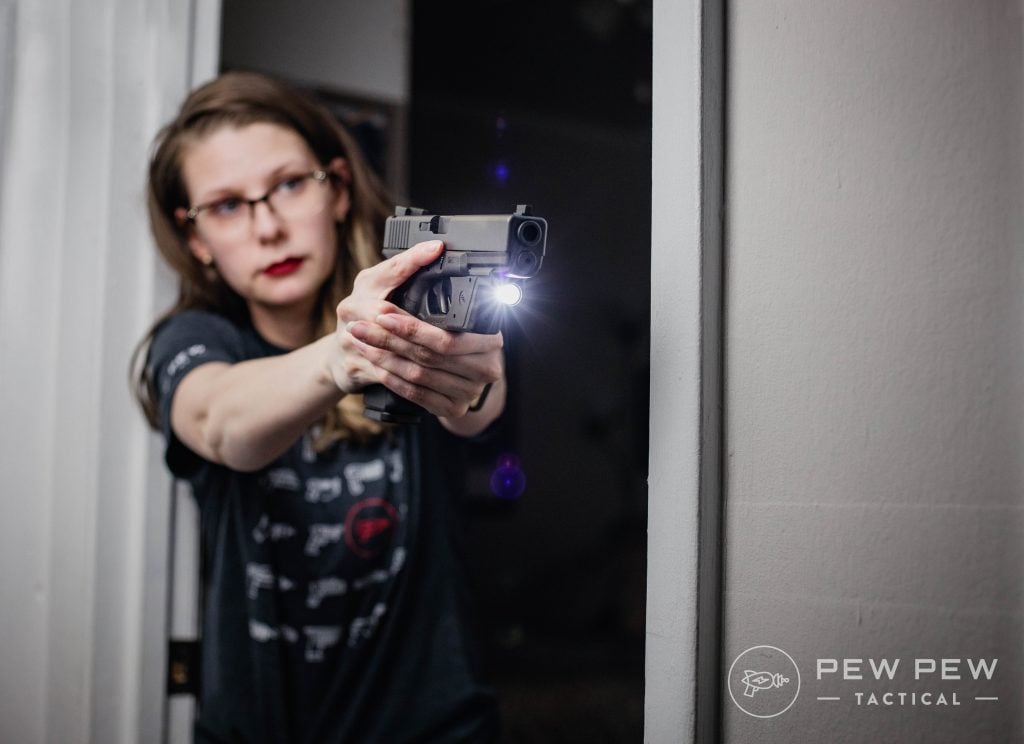
In Alaska, your home is your castle. Under what is commonly known as the “Castle Doctrine,” you can defend yourself when you are:
- At home (whether permanent or temporary)
- On your property (owned or leased)
- At work (inside a building)
- A guest in someone’s home
- A homeowner or resident’s implied agent
- Protecting a child or household member
- Somewhere where you have a right to be
You are justified in using or threatening physical force, including deadly physical force, against an aggressor when you reasonably believe physical force is necessary to neutralize a threat to you or someone else.
Standing Your Ground/Duty to Retreat
Alaska is a Stand Your Ground state that protects your right to self-defense in any place where you have the right to be, including your home, place of business, private property, and vehicle. There is no duty to retreat.
Of course, even with all these laws on self-defense, you should always use your best judgment to decide what type of force is appropriate. Just because you are allowed to use deadly force doesn’t mean you have to.
Taking any life is always a serious decision and may not always be necessary in order to end a threat to you and your loved ones.
Final Thoughts
And on that happy note, we’re done! If you’re lucky enough to live on the Last Frontier, it’s time to buy a gun (or three). Buy as many as you can and start punching holes in paper!
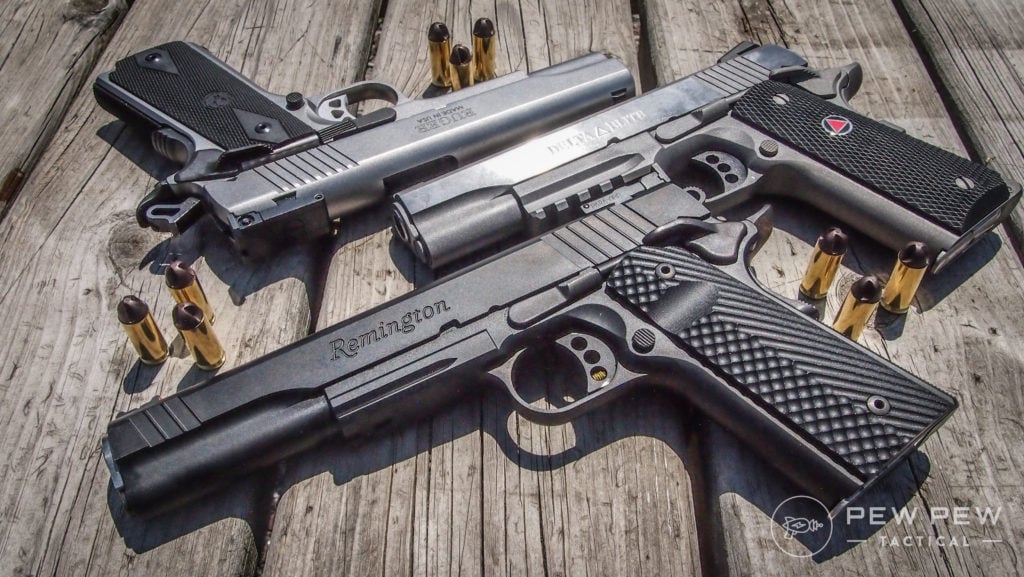
Of course, you’ll need a place to store all those guns. A sturdy safe can keep your guns from prying eyes and curious kids. If you want to start smaller, a gun cabinet, or even just a decent handgun safe may be a good investment. Getting proper training with your firearms is a good idea, too. Happy shooting!




